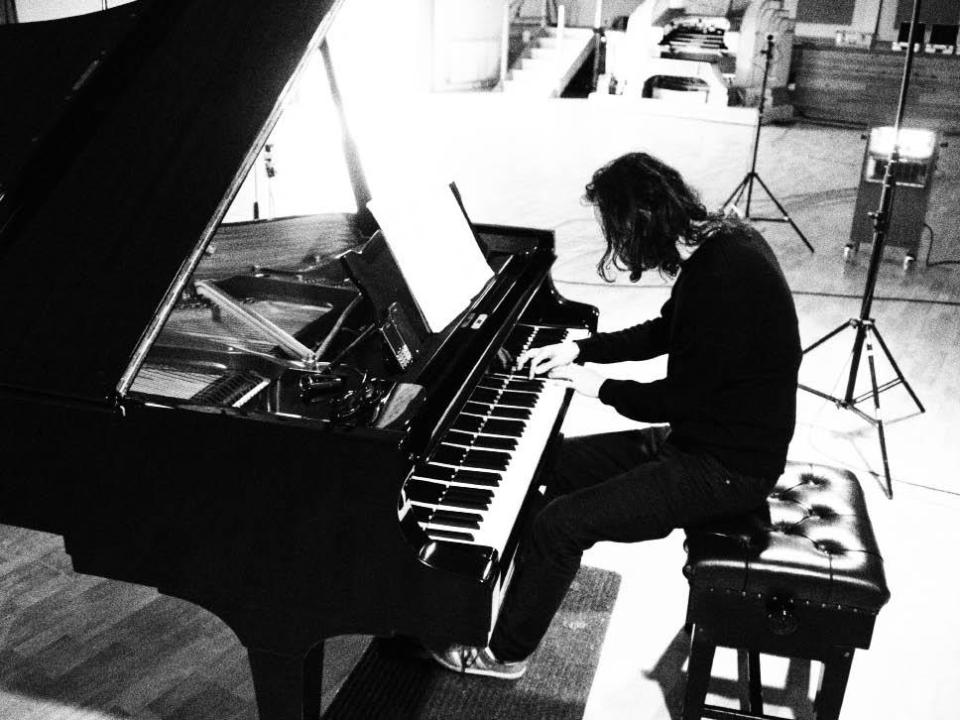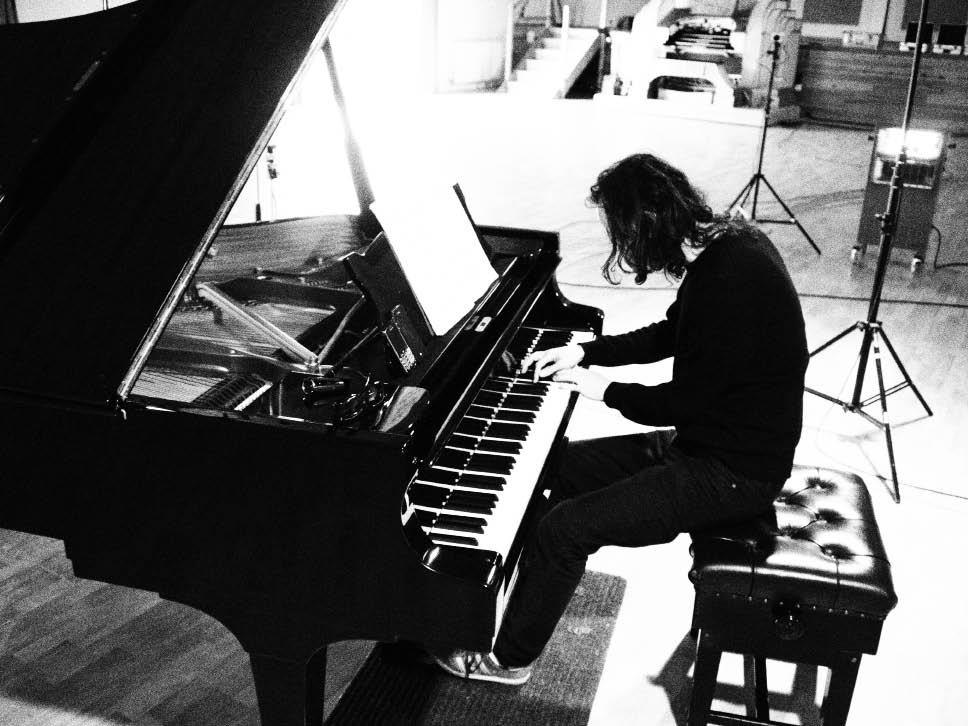James Rhodes is being hailed as one of Britain’s most exciting new musicians, and has just signed a six-album deal. Here, he describes his journey from psychiatric hospital to concert hall
So I’m sitting in what’s laughably called the Serenity Garden at a London psychiatric hospital that shall remain nameless, and one of the patients approaches me quietly and asks me what I do. Not what I’m locked up for (psych hospital etiquette forbids it), but what I do. She’s cute in an anorexic, self-harming kind of way, so I tell her that I play the piano. ‘What, like in a band?’ she asks, remarkably unslurred by meds. ‘No,’ I say. ‘Just me. I’m a concert pianist. Classical shit.’
‘Wow! Seriously? Man, that’s so cool! So I guess you started at like four years old and practised eight hours a day like for ever, and went to like Julliard or somewhere, huh? I bet you look awesome in your tux!’ (She happens to be American.) Our conversation was cut short when she stubbed her cigarette out on her arm. The nurses are peculiar like that.
I was thinking about that exchange recently (it happened about three years ago) and it struck me how the job title ‘concert pianist’, rather like ‘gynaecologist’ or ‘surfer’, inevitably conjures up specific images and histories in people. I think it’s appropriate, important even, to dispel the myth of the pianist as autistic/fragile/shrouded-in-his-own-genius/tux-wearing/idiot savant. And I present myself as exhibit A.
For those with no idea who I am (I imagine that would be most of you), I am 35 years old and am indeed a concert pianist. In the past 18 months my first two CDs (Signum) have topped the iTunes Classical charts and garnered decent reviews both here and abroad; I’ve performed at venues from the Queen Elizabeth Hall and the Roundhouse to fields at both the Hay and Latitude Festivals. I’ve just been signed to Warner Bros Records for six albums — the first time a major label has signed a core-classical musician. I’ve just finished filming a series on the greatest composers for Sky Arts, and presented a 90-minute BBC documentary about Chopin, broadcast last month.
I have never been to music college, never entered a competition (other than a delightfully enthusiastic yet spectacularly unsuccessful attempt at the BBC Young Musician of the Year as a teenager), I don’t have a specialist classical-music agent. I have some social skills, watch TV, wear jeans and trainers when I play, chat to the audience during my recitals and have a drink with them afterwards.
I started playing on my own aged seven or eight. At 11, I had a handful of lessons from a teacher who struggled to sight-read my Grade 2 pieces. At 14, I found an inspiring, quite brilliant teacher called Colin Stone. He was (is) the real deal — technically accomplished, meticulous, decent and above all nice. Unfortunately, I was far too interested in, obsessed with even, playing pieces so far beyond my ability as to be laughable. It didn’t stop me trying, but did put paid to any kind of technical progress, and so at 18 I abandoned the piano and did not touch a keyboard for more than ten years.
Instead, I went to work in the City in the (as it turns out false) belief that trying to make hideous amounts of money would compensate for the loss of my career as a pianist. It was only after going back to those 88 keys a few years ago with help from both Colin and Edoardo Strabbioli (a crazy, angry, almost psychotic Italian teacher) that the career of my dreams has started to take shape and, although it tempts fate to say it, flourish. The decision to return to the piano was largely taken for me. I had decided in a bout of self-pity to quit the City and become an agent for classical musicians. I figured I wasn’t anywhere near good enough to make it as a pianist so I thought I’d settle for doing it vicariously. I approached Franco Panozzo, agent to Grigory Sokolov, to my mind the greatest living pianist. A plan was hatched for me to go to Verona where he lived, where I would learn the ropes and then open a London office for him.
When I arrived, Panozzo asked me if I played the piano. We were in his beautiful house with a huge Yamaha grand in the centre of the living room. I mumbled something about playing a bit when I was a kid, and he asked me to play for him. I whacked out a Chopin étude more in hope than ambition. When I’d finished, I turned to see him staring at me open-mouthed. He told me that in 25 years of being an agent he had never heard anyone who wasn’t a professional pianist play like that. I was emphatically not going to be an agent, but I was going to come to Verona every month for four or five days and study with his friend Edoardo. So that was that.
I spent a good three or four years making that monthly trip and being shouted at, abused and beaten by Edoardo. We went right back to basics, learning simple pieces and focusing on the disciplines that I should have learnt when I was a kid. Within a year or two I was playing pieces I had never dreamed possible: Chopin’s 3rd sonata, Bach suites, Busoni transcriptions… I was in heaven. It was by no means an easy ride — hours of practice, entering a competitive market late in life, dealing with the enforced solitude of practice, constant criticism from myself and Edoardo. But to counter all of these things, I was living, eating and breathing music.
Of course the road to happiness is rarely even and along the way I got a little overwhelmed. ‘Sectioned’ is, I think, the technical term, and I spent about nine months in various mental institutions doing my level best to kill myself. Perhaps it was the pressure that came from knowing I finally had a shot at what I really wanted. And then there were childhood issues I had never addressed (sexual abuse tends to do that to people).
But I finally got out of hospital and continued playing. I met a stranger in a coffee shop and started chatting. Denis Blais is now my manager. Within two months, he had assembled a team and we had a record deal with Signum. A few tweets from Stephen Fry, who had enjoyed the CD and one of my concerts, and a couple of press interviews got the attention of Warner Bros, and after a few months and losing a few stone we signed a six-album deal. The first album has just been recorded and will be out next month.
The music is entirely core-classical (crossover classical holds no appeal for me) and helping out with the artwork for the album sleeve is Dave Brown (Bolo from the Mighty Boosh — if I see another 19th-century French watercolour on the cover of a classical CD I’ll want to rip my own face off).
The notion that the concert pianist has to be selected from birth and nurtured/trained cruelly for countless hours, that he or she can succeed only by winning competitions and attending the best conservatories is simply not true. I am the first to admit that I have a way to go technically speaking. I used to regret this hugely. I used to torture myself with the thought that if I had worked for hours a day from the age of four or five I would be able to tame Rachmaninov’s 3rd concerto, dazzle audiences with Stravinsky’s Petrouchka, dispatch Liszt’s études with apparent ease. But technical proficiency is not everything in music — a much ignored truth to which I owe my unlikely career. There’s a world of material well within my ability to perform well, and it will increase in size and breadth the more I practise.
I have no doubt that (like the immortal Terence Judd) I’d have been over the edge of Beachy Head or dangling from a rope had I gone to music college or won the Tchaikovsky Competition. I came close enough to that without the added pressure of remembering 40 concertos and 20 different concert programmes. Through luck, passion, sweat, flirting
and some quite spectacular medication, I have achieved the two things I’d always dreamed of — earning a living doing what I love most of all, and the mental/emotional acuity to enjoy it. Dealing with the (largely self-imposed) pressure of playing more than 100,000 notes from memory in my mid-30s is hard enough even with the support of friends, doctors, Jessica Alba and nicotine. Dealing with it as a teenager? Not a chance.
My days (when not touring/recording) are filled with what they should be: four hours of serious practice, endless cups of coffee, dates, friends, shopping, restaurants and fun. I’m aware of how lucky I am but I don’t take a second of it for granted.
To end on a slightly tree-hugging hippy-ish note — every great idea is initially seen as a blasphemy (Russell, I think, though I’m no doubt paraphrasing poorly). I left a job and a life I hated to follow my great idea, ignoring my raging head which told me I was blaspheming. And for all the self-doubt, stress, pressure and criticism, it is beyond wonderful. Against all the odds, I can now say with pride and truth something that seemed risible three years ago: I am, indeed, a concert pianist.
You can visit James Rhodes’ website, www.jamesrhodes.tv, and follow him on Twitter: www.twitter.com/JRhodesPianist.







Comments